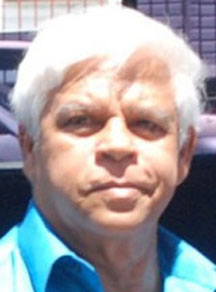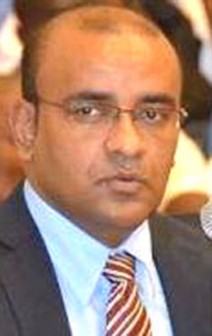Acting Chief Justice Ian Chang on Wednesday discharged the action to overturn the four-month suspension of CNS Channel 6 last year and to contest the constitutionality of the Advisory Committee on Broadcasting (ACB).
Handing down his decision in the case, which stemmed from former President Bharrat Jagdeo imposing the suspension as a sanction for a commentary that was aired, Justice Chang noted that the station owners admitted to breaching the law and that the proceedings did not allow for any order to be made against the president.
Jagdeo instituted the suspension based on the recommendation of the ACB. The ACB had recommended no less than a six months-long suspension but after careful consideration, which included the station owners’ financial difficulties, Jagdeo imposed a four months-long ban.

Justice Chang, in his 44-page decision, noted that the four-month penalty was imposed not by the ACB but by “the President qua Minister and no prerogative writ proceeding can be issued against the President who is the executive Head of State.” He added, “The Court cannot in these prerogative proceedings issue an order or rule nisi of any prerogative writs against the president – let alone an absolute prerogative writ. No doubt it would be open to a court to set aside an unlawful act or decision of the President in other proceedings even though the President himself cannot be subject to the curial processes. But this cannot be done in prerogative writ proceedings.”
Station owners CN Sharma and Savitree Singh were absent from the court when the decision was handed down.

Following the broadcast of a May 4, 2011 commentary on Bishop Juan Edghill by Anthony Vieira, Sharma was cited by the ACB for alleged breaches of the conditions of his licence. Lawyers for Sharma and Singh, Senior Counsel Rex McKay and attorneys Neil Boston, Christopher Ram and Bettina Glasford, applied for a court order to quash the ACB’s finding that there had been a breach and its recommended sanction against Channel 6.
They argued that the ACB was not lawfully constituted as required by regulation and that its decisions were as a result of no legal effect.
The lawyers also argued that the applicants were entitled to their fundamental right of freedom of expression as is set out in the constitution. They said that the finding and recommendation provided to the president by the ACB were unconstitutional and that the body failed to take reasonable steps to have an oral hearing to acquaint itself with all the relevant information so that it may make an informed decision as to whether the applicants had infringed any provision of the amended regulation of the Post and Telegraph Act.
Justice Chang stated that the holding of a broadcasting licence in the context of our domestic legal system is a matter of legal privilege rather than legal right, “the deprivation of which nevertheless attracts a prior right to a procedurally fair hearing.”
However, he added that “the Court is of the view that since the applicants were not denying but rather admitting the infringements and were claiming that the broadcast was made through human error and was not intentional, the failure of the ACB to give reasons for its findings was not unfair or required by the demands of natural justice – the principles of which are not inflexible or engraved in tablets of stone. Their application depends on the particular circumstances of the case.”
He said too that the enjoyment of freedom of expression as defined in Article 146 (1) of the Constitution is a non absolute constitutional right, while adding that there was no challenge to the constitutionality of Regulation 23 of the Wireless Telegraphy (Amendment) (No 2) Regulations. Added to that, Justice Chang said, there was no challenge to the power of the Minister to establish the ACB.
It was noted that the station owners had complained that the ACB was unlawfully constituted as member Ronald Case had ceased to be a member by virtue of the withdrawal of his nomination in 2003 by then Leader of the Opposition Robert Corbin. They also complained that the other committee members – Evan Persaud and Norman Mc Lean – did not meet the qualifications for nomination and appointment to the ACB as prescribed under the Act.
According to Justice Chang, the question arose as to whether Case, having been nominated in 2001 and having been appointed to the ACB by the Minister, ceased to be a member when Corbin withdrew that nomination in 2003.
“By the necessary implication the Regulation confers on the Leader of the Opposition the power to nominate a person or persons so that the Minister can perform his constitutive duty of establishing the committee with one member having been nominated by the Leader of the Opposition,” he said.
However, he noted that the Regulation does not “expressly or necessary implication” confer upon the Leader of the Opposition discretionary power to withdraw his nominee after the minister would have constituted or established the committee.
If the nominee ceases to be a member of the committee, the Leader of the Opposition will again be required to exercise his power of nomination, Justice Chang explained, adding that the Regulation does not give the Leader of the opposition the power to withdraw his nominee after the committee is constituted by the Minister.
He added that even if the appointments of Persaud, McLean and Case were invalid in law in that they were unqualified for membership, “their acts and decisions… cannot be viewed by the court as legally invalid or ineffectual for reason of the legal invalidity of the appointments.” Justice Chang said that there was no evidence to show that any of the members of the ACB knew what the prescribed qualifications were or even that they were unqualified to be members of the committee. “Indeed it does appear that they all had the colour of authority since they were all appointed as far back as 2001 without any subsequent challenge having been made to the appointment of any of them since then, until now,” he said, adding that based on the evidence the court could hardly conclude that any of them was an “usurper.”
Boston, moments after the decision was handed down, said that it will be looked at more in-depth and a decision will be taken on the way forward.
CNS Channel 6 had offered an “unequivocal apology” to Edghill, who had lodged a complaint with the ACB alleging that statements about him were “inaccurate, unsubstantiated, misleading and designed to damage his reputation.” Edghill subsequently filed a $25 million libel suit against Vieira and Sharma.





